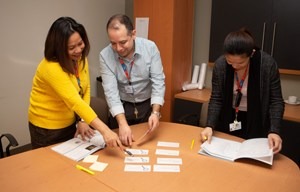GETTING TO THE ROOT OF WHY

EFFECTIVE DE-ESCALATION TECHNIQUES FOR RESPONSIVE BEHAVIOURS HELP STAFF AND PHYSICIANS SEE THE PERSON AND ADDRESS THEIR NEEDS

April 2, 2019 – Teams across Unity Health Toronto say training programs on managing responsive behaviours, which can include cursing and resistance to essential care, are having immediate and positive benefits. People with complex mental health, dementia and other neurological conditions may exhibit responsive behaviours, which are verbal and non-verbal actions that try to communicate what someone wants or feels.
“We’ve heard that staff feel safer, more confident and better equipped to compassionately care for patients and residents after participating in this training – which also helps support our workplace violence prevention strategies,” said Mitch Birken, senior director of Human Resources Consulting.
The Gentle Persuasion Approach (GPA) is used at Providence and St. Joseph’s and the Managing Responsive Behaviours (MRB) training is in place at St. Michael’s.
The two training programs share the same goal: to provide a variety of activities that can help staff successfully prevent and de-escalate responsive behaviours.

In the past, clinicians would use distraction methods alone to try to calm or divert attention in a patient showing responsive behaviours, which only provides transient solutions,” said Huy Ngo, the corporate advanced practice clinical educator who led the GPA initiative from conception to implementation at St. Joseph’s.
“What GPA teaches is a deeper understanding of why this happens, effective verbal de-escalation techniques and practicaltactics to work with the person to address their needs.”
Jube Walker, director of care at the Cardinal Ambrozic Houses of Providence and a certified GPA instructor, said she appreciates the program’s discussion about “personhood” and the explanation of a person’s journey with dementia.
“It really helps frame understanding and engagement in the training,” said Walker.
A working group co-led by Cecilia Santiago, a nursing practice manageratSt.Michael’s,designedtheMRBtrainingspecificallyfortheir acute-care context. St. Michael’s prioritized the work in support of the Senior Friendly Community of Practice initiatives through the Toronto Academic Health Science Network.

“Prior to MRB, we were using a lot of constant monitoring – keeping observers with patients at all times. However, there’s very little data to demonstrate that observation actually prevents harm, and it’s expensive,” said Santiago. “The benefits of MRB are felt by the patient, staff and our health-care system. Most importantly, it’s more personcentred.”
The impact of GPA and MRB is growing across our network. At Providence, 67 staff have completed the full-day training and the Houses leadership even hosted a session for families and caregivers. Twelve people attended that session.
Eight GPA-certified coaches at St. Joseph’s have trained 350 peopleasof January2019,whichisalmost93percentofitscompliance rate to reach 377 staff.
Since the start of the pilot, Santiago and the team have made alterations to the MRB curriculum with course materials for specific patient populations in different programs, and 479 practitioners have participated.
Trainingparticipants arereapingthebenefits andtheirfeedback is revealing how much they value the sessions.
“The best feedback I received came from a nurse who told me, ‘I came in thinking I would learn nothing and I left with information that I am eager to practice!’” said Ngo. “That’s the kind of response that makes me realize GPA is changing lives.”
